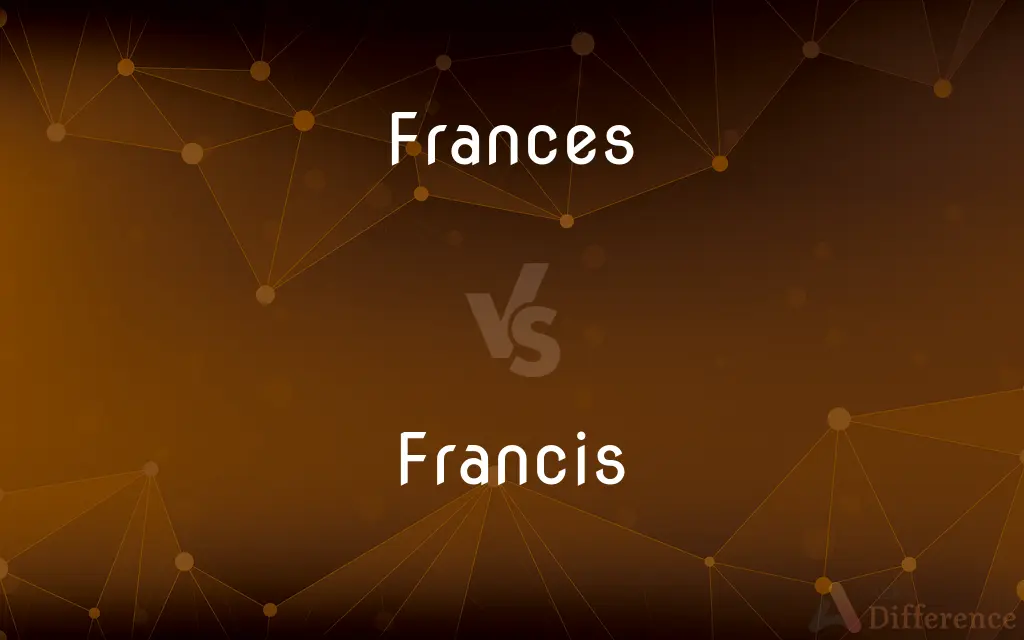Frances vs. Francis — What's the Difference?
By Tayyaba Rehman & Urooj Arif — Updated on February 29, 2024
Frances is a female name of Latin origin meaning "from France or free one," while Francis is a male name with the same origins and meanings.

Difference Between Frances and Francis
Table of Contents
ADVERTISEMENT
Key Differences
Frances and Francis, while phonetically similar, differ primarily in their traditional gender usage. Frances is commonly used for females, reflecting a naming tradition that often includes an "e" in feminine versions of names. Francis, on the other hand, is used for males, following a convention where "i" is used in the masculine forms.
The origin of both names is Latin, derived from the Roman clan name Franciscus, meaning "French" or "free one." This origin points to the historical significance and widespread use of these names across cultures, especially within Christian communities due to Saint Francis of Assisi.
In cultural contexts, Frances has been a popular name in English-speaking countries for centuries, often appearing in literature and popular media to denote characters of strength and integrity. Similarly, Francis has been borne by notable figures throughout history, including saints, kings, and scholars, reinforcing its association with leadership and spirituality.
The usage of Frances and Francis also extends to surnames and place names, reflecting the names' versatility and enduring popularity. However, as first names, they serve as a personal identifier that carries with it connotations of heritage, personality, and sometimes, familial connections.
Despite their shared origins and meanings, the distinction between Frances and Francis in contemporary naming practices is clear, with each name carrying its unique gender association. This differentiation is especially important in cultures and languages that place a significant emphasis on gender-specific names.
ADVERTISEMENT
Comparison Chart
Gender Usage
Female
Male
Meaning
"From France" or "free one"
"From France" or "free one"
Origin
Latin, from the Roman clan name Franciscus
Latin, from the Roman clan name Franciscus
Cultural Significance
Often associated with strength and integrity
Linked to leadership and spirituality
Notable Namesakes
Frances Hodgson Burnett, Frances McDormand
Saint Francis of Assisi, Francis Bacon
Compare with Definitions
Frances
Frances is a female first name of Latin origin meaning "free one."
Frances Perkins was the first woman appointed to the U.S. Cabinet.
Francis
Variants of Francis include Franco and Francesco.
Francesco is the Italian version of the name.
Frances
Variants of Frances include Francine and Fanny.
Francine is a common derivative used in French-speaking regions.
Francis
Francis is often associated with leadership and creativity.
Sir Francis Drake was an English sea captain and explorer.
Frances
It is often used in English-speaking countries.
Frances Burney was a celebrated 18th-century English novelist.
Francis
The name Francis appears in numerous historical and cultural contexts.
Francis Ford Coppola is a renowned American film director and producer.
Frances
The name is associated with traits of compassion and integrity.
Frances Harper was known for her work in the abolitionist movement and women's suffrage.
Francis
Francis is a male first name with Latin origins, meaning "free one."
Francis Scott Key wrote the lyrics to the United States' national anthem.
Frances
Frances can also appear in literature and popular culture.
Frances Baby Houseman is a character in the film Dirty Dancing.
Francis
It has been a popular name among saints and popes.
Pope Francis is known for his focus on humility and the poor.
Frances
Frances is a French and English given name of Latin origin. In Latin the meaning of the name Frances is: From France or 'free one.' The male version of the name in English is Francis.
Common Curiosities
What does Francis mean?
Francis means "from France" or "free one," originating from Latin.
What saint is associated with the name Francis?
Saint Francis of Assisi, known for his humility and love for nature and animals.
Can Francis be used for females?
Traditionally, Francis is a male name, but names are subject to personal or cultural preferences.
Are there any famous people named Frances?
Yes, Frances McDormand and Frances Perkins are notable individuals with this name.
Is Frances a male or female name?
Frances is traditionally a female name.
What are common nicknames for Frances?
Common nicknames include Fran, Frannie, and Frankie.
Has the popularity of the name Francis changed over time?
Yes, like most names, its popularity has fluctuated, often influenced by cultural and historical figures.
What historical figures have been named Francis?
Figures include Francis Bacon, an English philosopher, and Francis Drake, an English explorer.
How do Frances and Francis differ in pronunciation?
The pronunciation is very similar, with a slight variation in the vowel sound due to regional accents.
Is there a female version of Francis?
Frances is considered the female counterpart to the male name Francis.
What is the significance of the name Frances in literature?
The name Frances often signifies characters of depth, resilience, and complexity in literature.
What are common nicknames for Francis?
Common nicknames include Frank, Frankie, and Fran.
Are there variants of Frances in other languages?
Yes, variants include Françoise in French and Francisca in Spanish and Portuguese.
Can Frances and Francis be used as surnames?
Yes, both can and have been used as surnames.
Is there a specific meaning behind the name Frances in different cultures?
While meanings can vary slightly, "free one" is the most common interpretation across cultures.
Share Your Discovery

Previous Comparison
Programmed vs. Programed
Next Comparison
Fulfil vs. FulfillAuthor Spotlight
Written by
Tayyaba RehmanTayyaba Rehman is a distinguished writer, currently serving as a primary contributor to askdifference.com. As a researcher in semantics and etymology, Tayyaba's passion for the complexity of languages and their distinctions has found a perfect home on the platform. Tayyaba delves into the intricacies of language, distinguishing between commonly confused words and phrases, thereby providing clarity for readers worldwide.
Co-written by
Urooj ArifUrooj is a skilled content writer at Ask Difference, known for her exceptional ability to simplify complex topics into engaging and informative content. With a passion for research and a flair for clear, concise writing, she consistently delivers articles that resonate with our diverse audience.














































